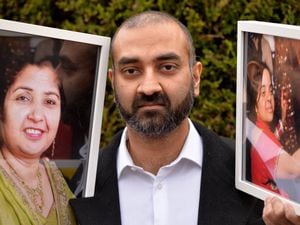Cancer doesn't wait - why you should act on any concerns now
Fear and worry around coronavirus has led to fewer people acting on symptoms of cancer. Dan Morris shines a spotlight on the importance of continuing to seek help quickly.
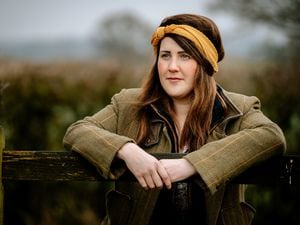
For the best part of a year now, Covid-19 has dominated the headlines as one of the greatest medical crises of our time. Yet sadly, it is far from the only ‘Big C’ we need concern ourselves with, and it has led to a number of us dropping our guard with the other.
Regional and national charities have expressed concern over the lack of people coming forward with suspected cancer symptoms compared to before the pandemic.
Attributing this to both fear of Covid infection through visiting medical centres, and a worry that doctors have enough on their plate with coronavirus patients, the Shropshire-based Lingen Davies Cancer Fund has shed light on a reduced number of enquiries, and Cancer Research UK has also raised fears that certain groups of potential cancer sufferers are failing to act on the warning signs.
Covid-19 coverage:
A survey commissioned by Cancer Research UK last year revealed that 53 per cent of 1,000 participating GPs were concerned that fewer older adults were now contacting them with cancer symptoms.
Other groups they were worried about hearing less from included patients with learning difficulties (40 per cent), those whose first language is not English (35 per cent), people from poorer backgrounds (23 per cent), members of ethnic minorities (22 per cent) and those with existing health conditions (21 per cent).
Age remains the biggest risk factor for cancer and every year more than a third (36 per cent) of all cases in the UK are diagnosed in people aged 75 and over. The awful truth however, is that cancer does not restrict itself to the elderly, and we must all – regardless of age or background – act on any signs or symptoms as soon as possible.
Since the coronavirus pandemic began, The Lingen Davies Oncology Centre at Royal Shrewsbury Hospital (RSH) has seen a drastic drop in the number of people it has seen for diagnosis referrals.
In 2019 it saw almost 40,000 appointments in total, comprising new and returning patients from all over Shropshire and Mid Wales. However, since the arrival of Covid-19, the Lingen Davies Cancer Fund believes that many people with cancer concerns have chosen not to present themselves at doctors’ surgeries through fear of the virus, and subsequently have not been referred to the centre for additional tests. Without these tests, their diagnoses have been delayed or even missed, and potentially life-saving treatment has not been started when it could have been.
As the pandemic goes on, the charity worries that people with cancer symptoms will continue to steer clear of GP’s surgeries and treatment centres, and many in need of crucial medical help will delay seeking it until it is too late.
Lingen Davies’s message is simple – if you have any concerns or symptoms relating to cancer, do not wait; cancer will not.

Mary Evans, 28, from Prees near Whitchurch, was diagnosed with breast cancer last March, just as the pandemic began to truly take hold of the country.
“In January 2020, I noticed a hardening lump in my left breast,” she said. “I wasn’t concerned about it at first as I’d never really checked my breasts before.
“Six weeks later, at the end of March, the lump was still there so I decided to give my GP a call – right at the beginning of the first Covid-19 lockdown.
“My GP referred me to the Shrewsbury and Telford Breast Clinic and two weeks later I went for my breast screening appointment. The ultrasound quickly turned into a biopsy, and that’s when the alarm bells started ringing.”
Braced for the worst, Mary and her fiance Dave prepared for her appointment to discuss the results.
“I attended my appointment at Telford and, because of coronavirus, I had to go in alone,” she said. “When the doctors asked me if I wanted to bring Dave with me, I knew in that moment that it was bad news.
“The doctor told me it was breast cancer and gave me the opportunity to ask any questions. I asked if I would lose my hair, if I would still be able to have children, and if I could carry on working.
“They told me that I would lose my hair, but as far as being able to have children, they would refer me to a fertility clinic to have that side of things looked at. They also told me that people do work, and people do carry on.
“I left through a side door and Dave was stood waiting for me on the hill. He rushed over and saw me holding a folder that read ‘Primary Breast Cancer’. We stood there crying and hugging – it was a moment I will never forget.”
Supported
Throughout her journey so far, Mary has been supported by Lingen Davies, having received much of her treatment at the RSH cancer unit.
When her symptoms first surfaced Mary was worried about being an additional strain on an NHS that was busy with Covid-19. Thankfully though, she pushed such thoughts aside, sought the medical advice that was needed and has begun the treatment she requires.
“It scares me – the amount of people that are sitting at home and not being diagnosed, maybe not going to the doctor,” she said. “I think that it’s terrifying to think of the ramifications that it’s going to have in the future, because it will.
“Unfortunately we are in a very unprecedented time, but cancer doesn’t wait and the problem is people are worried that they’re wasting NHS time or their doctor’s time, and I was guilty of that at the beginning. I think that people just have to be brave and know that the NHS is there for you.
“If people don’t take action, then we are going to see thousands and thousands more deaths going forward.
“I’m just hoping that people listen and go and get checked out.”
Nationally, the number of people being urgently referred for suspected cancer dropped by an estimated 75 per cent at 2020’s worst point of the pandemic. This meant that far fewer people were being referred for diagnostic tests and specialist consultation, and that up to 2,300 cancer cases a week were not being diagnosed.
Cancer remains one of the leading causes of death in the world, and its mercilessness has not yielded because of another global health concern. Before Covid-19 there were around 306,000 new cases of cancer in England each year, and sadly, around 135,000 deaths.
Early diagnosis followed by swift access to the most effective treatment remains as important as ever for survival, a message echoed by team members at the Shrewsbury and Telford Hospital NHS Trust (SaTH).
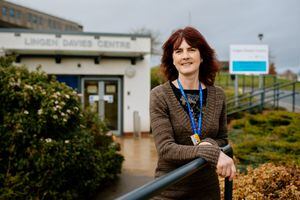
Louise Killey, Radiotherapy Services Manager, said: “Please do not be worried over having to attend the hospital – your safety is at the heart of everything we do.
“It is extremely important that if you have any concerns over your health that you contact your GP, so that any investigations and subsequent treatment that is required can be undertaken to maximise the chance of successful treatment.
“We have adapted our practice with the use of PPE, social distancing and some telephone consultations to ensure that radiotherapy can continue in a Covid-safe environment.”
Laura Pettit, Oncology Consultant, added: “The Lingen Davies Cancer Centre has remained open throughout the Covid-19 pandemic, offering treatment with both radiotherapy and systemic therapy for cancer patients.
“We have taken numerous precautions to keep both our patients and our staff safe. If you have a symptom you are concerned about you should seek help from your GP as soon as possible.”
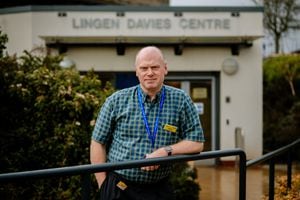
And Paul Evans, Head of Radiotherapy Physics, said: “The technology behind modern radiotherapy has improved beyond recognition in the 25 years I have worked here.
“People should not hesitate to contact their GP or attend screening appointments. In the unfortunate case of a cancer diagnosis, they can benefit from huge improvements in cancer outcomes as early as possible.”
Worry around the potential diagnosis of cancer has naturally always been there among those who have concerning symptoms. It doesn’t take the added fear of contracting a dangerous virus like Covid-19 to make signs of cancer frightening, though a number of survivors and loved ones of those undergoing treatment agree that facing your concerns and acting quickly is always the best course.
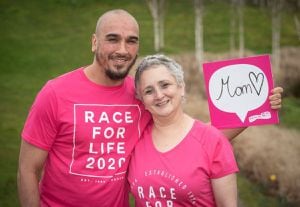
Walsall social worker Anne Marie Lennon was diagnosed with non-Hodgkin Lymphoma in April 2019 after finding a lump in her chest.
“I thought nothing of it at first,” said Anne Marie. “They said it was most likely a sarcoma so I just thought they would cut it out and that would be that. It wasn’t until I’d had lots more tests that they told me it was stage four non-Hodgkin Lymphoma.
“I was in shock at first and I couldn’t really process it. I was told it was treatable and that there was a 70 per cent survival rate, but all I could think about was ‘who are the 30 per cent and why?’”
Anne Marie underwent four months of chemotherapy and steroid treatment before returning to work as a child protection conference chair for Walsall Borough Council.
“I’ve been told I’ll have to live with low grade lymphoma for the rest of my life,” she added, “and there’s always a fear that the cancer could come back. But you just have to take each day as it comes and get on with it. My manager at work and their manager have been fantastic and supported me throughout – I couldn’t have done it without them.”
Her advice to anyone unsure of whether they should consult their GP over any concerns or worries is simple.
“Had I not gone to have the lump checked I wouldn’t be here now,” she said. “Don’t feel stupid – go to the doctor’s. If it’s nothing, then it’s nothing. But if it’s something, the quicker it’s looked at, the better.”
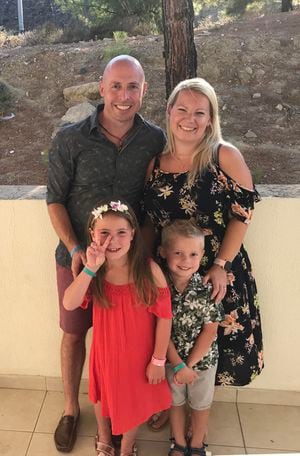
Grace Harris, 33, from Rugeley, was diagnosed with thyroid cancer in 2018 after filming herself swallowing a glass of water in slow motion. Treatment involved having her entire thyroid gland removed before being isolated in a lead-lined room to undergo radioactive iodine treatment.
“I kept getting a stabbing pain in my neck and it would hurt to talk,” said Grace, who lives with her husband Paul and their children Georgina, ten, and Jacob, eight.
“I found some online advice about swallowing some water to see if there was a lump.
“Paul filmed it so that I could watch it back in slow motion. That’s when I saw there was a golf ball-sized lump right where it was hurting.”
Although Grace had a blood test, nothing out of the ordinary showed up so she asked her GP for a cancer referral.
“He told me I was very young but he got me a scan at Stafford two weeks later,” said Grace.
Precaution
After being informed she had thyroid cancer, Grace underwent surgery to remove the half of her thyroid where the lump was located. She then decided to have the other half removed as a precaution when tests showed the cancer might spread to other parts of her body.
Grace is now completely cancer free, and has no regrets about acting quickly when signs of trouble presented themselves.
“I didn’t think at first that it would be cancer,” she said, “But as soon as we found the lump I wanted to go to the doctors’ straight away as otherwise I would have worried and worried. For me it was about tackling it head on and dealing with it.
“Don’t wait. Any waiting and wondering is the worst part. As soon as you can find out what you’re dealing with and tackle it, the better.
“And don’t be afraid of Covid getting in the way of treatment – getting treatment is the most important thing.”
Sadly, cancer does not restrict itself to those who may be able to spot the signs for themselves, nor to those whose responsibility it is to seek their own medical advice and action.
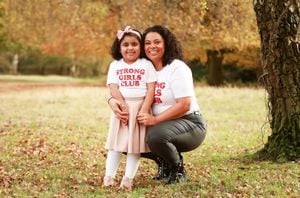
Four-year-old Martha Givans from Sutton Coldfield was diagnosed with Acute Lymphoblastic Leukaemia just before she started school in July.
She was diagnosed at Birmingham Children’s Hospital after her mother, Natalie, took her for a blood test on the advice of her GP.
“My mum kept saying ‘she’s really pale’,” said Natalie. “She didn’t have any other symptoms but eventually I called the GP. I didn’t want to go into hospital because of Covid but the doctor advised me to take her to the Children’s Hospital for a blood test. We got there at 9am and I got a call while I was shopping three hours later telling me to bring her back.
“I was in a complete panic. I knew it must be cancer but they couldn’t tell me until we had the results of more tests.”
Results of initial tests were inconclusive so Martha and Natalie had to stay in hospital for another three days before finding out what was wrong.
“I refused to Google anything,” said Natalie. “After three days I was told it was leukaemia. It all felt like a dream but I was just thankful she had the most treatable type.”
Although prognosis was hopeful, Martha still needed immediate chemotherapy and her treatment will not finish until 2022.
“Everything seemed to happen at once,” said Natalie. “She was really poorly with the first lot of chemo because she had to have a high dose of steroids for six weeks.
Thankful
“What was worse was that she didn’t want to play and she didn’t smile for weeks. It was like the lights were on but there was no one home. It was horrendous.”
Naturally though, Natalie is thankful she put her initial fears of visiting the hospital due to any risk of Covid aside.
“When Martha was diagnosed the whole world completely changed in eight seconds,” she said. “The doctors said that if I’d left it any longer, the situation could have been different. If I hadn’t taken her I might still not know she had cancer now.”
Natalie’s advice to other parents with concerns is not to wait either.
“You have to contact your GP without a second thought. Be brave, speak to the doctors.”
Over the last year, coronavirus and the threat it has presented have led most of us to look at our health and that of our loved ones with greater attentiveness.
With this however it is crucial that none of us allow concerns regarding one deadly health risk to eclipse our judgment of another. Cancer is very real, and there are no circumstances in which its warning signs should be ignored.
“NHS staff have made huge efforts to deal with coronavirus but they are also working hard to ensure that patients can safely access essential services such as cancer checks and urgent surgery,” said Professor Peter Johnson, NHS National Clinical Director for Cancer.
“My message is clear: people should seek help as they always would. We know that finding cancer early gives us the best chance to cure it, and ignoring potential problems can have serious consequences now or in the future.”
For help and advice on spotting the signs and symptoms of cancer, visit nhs.uk/conditions/cancer/symptoms and cancerresearchuk.org/about-cancer/cancer-symptoms
What to look out for
Not every person with cancer has symptoms, but spotting cancer early saves lives. Here, Cancer Research UK offers advice on some of the signs to be aware of.
There are over 200 different types of cancer that can cause many different symptoms. Sometimes symptoms are linked to certain cancer types. But signs can also be more general, including weight loss, tiredness (fatigue) or unexplained pain.
You don’t need to try and remember all the signs and symptoms of cancer, but we have listed some key ones to give you an idea of the kind of things to be aware of. These symptoms are more often a sign of something far less serious – but if it is cancer, spotting it early can make a real difference. It’s always best to listen to your body and talk to your doctor if something doesn’t feel quite right. Whether it’s a change that’s new, unusual, or something that won’t go away – get it checked out.
General cancer symptoms
Unexplained pain or ache: Pain is one way our bodies tell us that something is wrong. As we get older, it‘s more common to experience aches and pains. But unexplained pain could be a sign of something more serious.
Very heavy night sweats: Sweating at night can be caused by infections or it can be a side effect of certain medications. It’s also often experienced by women around the time of the menopause. But very heavy, drenching night sweats can also be a sign of cancer.
Unexplained weight loss: Small weight changes over time are quite normal, but if you lose a noticeable amount of weight without trying to, tell your doctor.
Unusual lump or swelling anywhere: Persistent lumps or swelling in any part of your body should be taken seriously. That includes any lumps in the neck, armpit, stomach, groin, chest, breast or testicle.
Fatigue: There are lots of reasons you may feel more tired than usual, particularly if you’re going through a stressful event, or having trouble sleeping. But if you’re feeling tired for no clear reason, it could be a sign that something is wrong – speak to your doctor.
Skin changes
Sore that won’t heal: The skin repairs itself very quickly and any damage usually heals within a week or so. When a spot, wart or sore doesn’t heal, even if it’s painless, a doctor needs to check it.
New mole or changes to a mole: Most moles are harmless. But be aware of any new moles or existing moles that change in size, shape or colour, become crusty, itch, hurt, bleed or ooze. The ABCDE checklist gives more details about the key changes you should always tell your doctor about.
Other skin changes: Any unusual change in a patch of skin or a nail, whether it’s a new change or has been there for a while, should be checked out by your doctor.
Symptoms that affect eating
Difficulty swallowing: Some medical conditions can make it difficult to swallow. Talk to your doctor if you are having difficulty swallowing and the problem doesn’t go away.
Unusual heartburn or indigestion: It is normal to feel slight discomfort or pain sometimes after eating a large, fatty or spicy meal. But if you have heartburn (acid reflux) or indigestion a lot, or if it is particularly painful, then you should see your doctor.
Appetite loss: Appetite loss can happen for many different reasons. Speak to your doctor if you’ve noticed you’re not as hungry as usual and it’s not getting any better.
Symptoms that affect your voice and breathing
Croaky voice or hoarseness: Having a croaky voice or feeling hoarse can be common with colds. But a croaky voice that hasn’t gone away on its own should be checked out.
Persistent cough: Coughs are common with colds and some other health conditions. But if an unexplained cough doesn’t go away in a few weeks or gets worse, it could be a sign of cancer.
Breathlessness: It’s not unusual to feel out of breath every now and then. But if you notice that you’re feeling breathless more than usual or for a lot of the time, tell your doctor.
For more information visit cancerresearchuk.org/about-cancer/cancer-symptoms
Fighting the fight
Last year was one of the most difficult that charities have ever had to face, yet those such as the Lingen Davies Cancer Fund continue to play a pivotal role in improving cancer services on a local level, and in the wider effort to fight and eventually beat this disease.
It is vital that support for such causes continues even during these difficult times.
Helen Knight, Development Manager for Lingen Davies, said: “Covid has impacted on each and every one of us, for so many different reasons. As we look further into 2021, we all live in hope that things will start to return back to the new normal. I am pleased that we have been able to continue to work throughout the pandemic, and support the team at the RSH cancer centre, who have continued with cancer services and treatment.
“For us we need to ensure that we raise funds so that cancer patients are getting the best possible treatment now, and in the future. We don’t want people travelling out of the area to get the best treatment, and we also want to ensure that our rural communities feel supported so they do not feel isolated, or alone whilst dealing with their cancer treatment, and diagnosis. Last year, like for so many other charities and businesses, our ability to raise funds was hit massively, and this year we look to our communities to get behind local charities and support us.”
Started in 1979 by Bernard Lingen, then Mayor of Shrewsbury, and local accountant Frank Davies, the Lingen Davies Cancer Fund has contributed around £18million in today’s prices to improve cancer services in the local area. An estimated 75,000 people have had their cancer treatment and care improved through the impact of the charity and its continued commitment.
“We cannot continue to do what we do without you,” added Helen. “Our current appeal is to buy a new CT scanner and to extend the Lingen Davies Cancer Centre, so we have more space to see patients. You can support us by visiting our website at lingendavies.co.uk or call our office on 01743 492396.”





